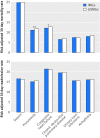Quality of care delivered by general internists in US hospitals who graduated from foreign versus US medical schools: observational study
- PMID: 28153977
- PMCID: PMC5415101
- DOI: 10.1136/bmj.j273
Quality of care delivered by general internists in US hospitals who graduated from foreign versus US medical schools: observational study
Abstract
Objective: To determine whether patient outcomes differ between general internists who graduated from a medical school outside the United States and those who graduated from a US medical school.
Design: Observational study.
Setting: Medicare, USA.
Participants: 20% national sample of data for Medicare fee-for-service beneficiaries aged 65 years or older admitted to hospital with a medical condition in 2011-14 and treated by international or US medical graduates who were general internists. The study sample for mortality analysis included 1 215 490 admissions to the hospital treated by 44 227 general internists.
Main outcome measures: Patients' 30 day mortality and readmission rates, and costs of care per hospital admission, with adjustment for patient and physician characteristics and hospital fixed effects (effectively comparing physicians within the same hospital). As a sensitivity analysis, we focused on physicians who specialize in the care of patients admitted to hospital ("hospitalists"), who typically work in shifts and whose patients are plausibly quasi-randomized based on the physicians' work schedules.
Results: Compared with patients treated by US graduates, patients treated by international graduates had slightly more chronic conditions. After adjustment for patient and physician characteristics and hospital fixed effects, patients treated by international graduates had lower mortality (adjusted mortality 11.2% v 11.6%; adjusted odds ratio 0.95, 95% confidence interval 0.93 to 0.96; P<0.001) and slightly higher costs of care per admission (adjusted costs $1145 (£950; €1080) v $1098; adjusted difference $47, 95% confidence interval $39 to $55, P<0.001). Readmission rates did not differ between the two types of graduates. Similar differences in patient outcomes were observed among hospitalists. Differences in patient mortality were not explained by differences in length of stay, spending level, or discharge location.
Conclusions: Data on older Medicare patients admitted to hospital in the US showed that patients treated by international graduates had lower mortality than patients cared for by US graduates.
Published by the BMJ Publishing Group Limited. For permission to use (where not already granted under a licence) please go to http://group.bmj.com/group/rights-licensing/permissions.
Conflict of interest statement
Competing interests: All authors have completed the ICMJE uniform disclosure form at
Figures


References
-
- Brotherton SE, Etzel SI. Graduate Medical Education, 2014-2015. JAMA 2015;314:2436-54. 10.1001/jama.2015.10473 pmid:26647275. - DOI - PubMed
-
- General Medical Council. The state of medical education and practice in the UK. 2015.
-
- Mullan F. The metrics of the physician brain drain. N Engl J Med 2005;353:1810-8. 10.1056/NEJMsa050004 pmid:16251537. - DOI - PubMed
-
- Thompson MJ, Hagopian A, Fordyce M, Hart LG. Do international medical graduates (IMGs) “fill the gap” in rural primary care in the United States? A national study. J Rural Health 2009;25:124-34. 10.1111/j.1748-0361.2009.00208.x pmid:19785577. - DOI - PubMed
-
- Whelan GP, Gary NE, Kostis J, Boulet JR, Hallock JA. The changing pool of international medical graduates seeking certification training in US graduate medical education programs. JAMA 2002;288:1079-84. 10.1001/jama.288.9.1079 pmid:12204075. - DOI - PubMed
Publication types
MeSH terms
Grants and funding
LinkOut - more resources
Full Text Sources
Other Literature Sources
Research Materials
